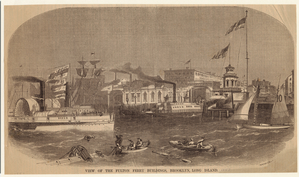 |
| Engraving of Fulton Landing in 1857 by William J. Peirce from the NY Public Library |
Whitman is the most significant poet in American history. His seminal work Leaves of Grass, of which Crossing Brooklyn Ferry is the opening poem, is the first great work of free verse poetry in the United States. And its themes of everyday life of working people and the beauty of the world of humans gave the work a democratic tone that flies in the face of poetry's sometimes elitist and ethereal nature. Whitman's importance is even greater in New York City.
Whitman was born on Long Island in 1819 and worked in the publishing industry and teaching in his early life. He would bounce around the New York area, working in Long Island, Jamaica Queens, Brooklyn, and New York. His most prominent position came as editor of the Brooklyn Eagle from 1846 to 1848. The Eagle's offices were located on Fulton Street, right near the Fulton Ferry that would have brought commuters and pleasure-seekers to New York. Before 1898, Brooklyn was an independent city, but one surrounded by water and the only way to reach Brooklyn was by the ferries that crossed the East River.
In Leaves of Grass, Whitman would celebrate the lives of everyday workers, the quest for self-realization, and the pleasures of the senses (both carnal and innocent). Those themes are all evident in Crossing Brooklyn Ferry, but what makes the work so compelling to a modern New Yorker is that it is written for them. The opening stanza observes the rush of commuters home on the ferry and then remarks "And you that shall cross from shore to shore years hence, are more to me, and more in my meditations, than you might suppose." Whitman then strings together a wave of imagery of the ferry ride of the 1850s and projects forward to the minds of New Yorkers many years beyond saying "I am with you, you men and women of a generation, or ever so many generations hence; I project myself—also I return—I am with you, and know how it is." Having crossed the Staten Island Ferry so many times, I have also seen the sun and tides and seagulls Whitman observes. But Whitman keenly knows that the city I inhabit will seem unimaginably different than the one of his time. But no matter, the tides and sunsets remain eternal. As does the hum and clatter if the city itself and its people.
This mix of timelessness and inevitable change is central to New York's identity. New York is unlike other East coast cities who have protected their historic character and preserved old colonial buildings. It is not like Western and Southern cities with their modern highways and homes. New York is both old and new. It's past visible only in the faintest outlines, but it is there. And when you think of Whitman's ferry passengers, packed tight and rushing home the outlines of the city's past suddenly become sharper and clearer. Here is a link to the full text of the poem: http://www.bartleby.com/142/86.html
For those looking to recreate Whitman's ride, there has been a new East River Ferry service for a few years and it does run from Fulton Ferry to Wall Street for a mere $4. Check the schedule here:
For those looking to recreate Whitman's ride, there has been a new East River Ferry service for a few years and it does run from Fulton Ferry to Wall Street for a mere $4. Check the schedule here:

No comments:
Post a Comment